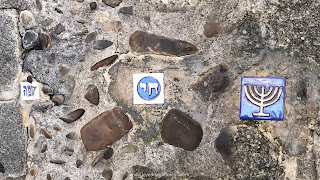In Spain since the transition to democracy there has been a conscious effort to recover the country's Jewish past. The result of this is the network of medieval Jewish quarters which can be visited in cities as diverse as Toledo, Alcalá de Henares, Córdoba and Granada. Besides restoring ancient synagogues such as El Tránsito in Toledo, the streets have been landscaped with Jewish symbols even on the cobble stones as a means of attracting tourism.
This is however little more than a Disney World of Jewishness. A previous government established the Centro Sefarad in Madrid, where exhibitions, round tables and other events are held to discuss the country's Jewish past and present. I've been to one of these events and while there was a very big audience of people defining themselves as "allies of the Jews" or "allies of Israel", there was a distinct absence of Jews. Despite that, you had to arrive early to get past the airport type security to get into the building. Even gentiles seem to need security to discuss matters Jewish in Spain.
Madrid's Sephardi synagogue is a closed affair. The building has a permanent police presence and to even get on the community's mailing list, you need to send them your official ID and then make an appointment on a specific date or time to formally register yourself . This isn't just for security. So little is known about the Jewish community that journalists often try to turn up to research their customs and traditions and the resulting coverage can often be ill informed, patronising or both. I read an article a few years ago in El País, in which the reporter seemed to be more interest in how Jewish people got their children circumcised. So few people even have knowingly met a Jewish person and a lot of myths still abound.
It seems a large part of the current Sephardi community in Madrid is of Moroccan origin, however there are also an increasing number of secular Argentinian Jews in Madrid and Barcelona. Immigration in recent years has led to liberal, reform and conservative synagogues springing up, however these are entirely hidden, in appartments, and in one case meeting up almost secretly at a cultural centre on Shabbat. A growing number of Spanish people are converting and there is a Jewish school in the suburbs of the city. However most Jewish people one meets don't practice and few keep the halakha.
Judaism is still very much a mystery in Spain, and its past is a quaint tourist attraction. Interestingly, when in 2015 Spain introduced a right of return for the historic Sephardic community, scant attention was given to how their culture and traditions were wiped not just from Spain's present but also from the country's memory. One of the conditions of acquiring nationality was to demonstrate some kind of cultural or social affinity to modern Spain. Clearly, many potential candidates nowadays have little connection to the country or the much confected history of the place that is in modern Spaniards' collective imagination. Spanish embassies and consulates in countries like Turkey are trying to reestablish a connection with the Ladino community, however much of this is a Jewish equivalent of greenwashing. Nowadays few Jews consider emigrating to Spain and many who claimed nationality did it more to get a passport to Europe than as a means of moving to Spain.
Modern day Sepharad is barely a work in progress.



|